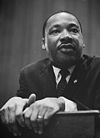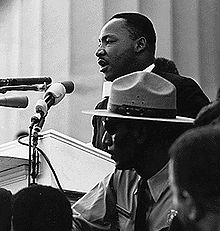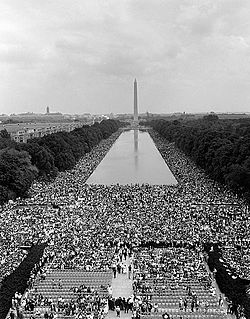- I Have a Dream
-
This article is about the speech by Martin Luther King, Jr.. For other uses, see I Have a Dream (disambiguation).
"I Have a Dream" is a 17-minute public speech by Martin Luther King, Jr. delivered on August 28, 1963, in which he called for racial equality and an end to discrimination. The speech, from the steps of the Lincoln Memorial during the March on Washington for Jobs and Freedom, was a defining moment of the American Civil Rights Movement. Delivered to over 200,000 civil rights supporters,[1] the speech was ranked the top American speech of the 20th century by a 1999 poll of scholars of public address.[2] According to U.S. Representative John Lewis, who also spoke that day as the President of the Student Non-Violent Coordinating Committee, "Dr. King had the power, the ability, and the capacity to transform those steps on the Lincoln Memorial into a monumental area that will forever be recognized. By speaking the way he did, he educated, he inspired, he informed not just the people there, but people throughout America and unborn generations."[3]
At the end of the speech, King departed from his prepared text for a partly improvised peroration on the theme of "I have a dream", possibly prompted by Mahalia Jackson's cry, "Tell them about the dream, Martin!"[4] He had first delivered a speech incorporating some of the same sections in Detroit in June 1963, when he marched on Woodward Avenue with Walter Reuther and the Reverend C. L. Franklin, and had rehearsed other parts.[5]
Contents
Style
Widely hailed as a masterpiece of rhetoric, King's speech resembles the style of a Baptist sermon (King himself was a Baptist minister). It appeals to such recognizable and widely respected sources as the Bible and invokes the Declaration of Independence, the Emancipation Proclamation, and the United States Constitution. Early in his speech, King alludes to Abraham Lincoln's Gettysburg Address by saying "Five score years ago..." Biblical allusions are also prevalent. For example, King alludes to Psalm 30:5[6] in the second stanza of the speech. He says in reference to the abolition of slavery articulated in the Emancipation Proclamation, "It came as a joyous daybreak to end the long night of their captivity." Another Biblical allusion is found in King's tenth stanza: "No, no, we are not satisfied, and we will not be satisfied until justice rolls down like waters and righteousness like a mighty stream." This is an allusion to Amos 5:24.[7] King also quotes from Isaiah 40:4-5—"I have a dream that every valley shall be exalted..."[8] Additionally, King alludes to the opening lines of Shakespeare's "Richard III" when he remarks, "this sweltering summer of the Negro's legitimate discontent will not pass until there is an invigorating autumn..."
Anaphora, the repetition of a phrase at the beginning of sentences, is a rhetorical tool employed throughout the speech. An example of anaphora is found early as King urges his audience to seize the moment: "Now is the time..." is repeated four times in the sixth paragraph. The most widely cited example of anaphora is found in the often quoted phrase "I have a dream..." which is repeated eight times as King paints a picture of an integrated and unified America for his audience. Other occasions when King used anaphora include "One hundred years later," "We can never be satisfied," "With this faith," "Let freedom ring," and "free at last."
Speech title and the writing process
The speech, known as "I Have a Dream Speech", has been shown to have had several versions, written at several different times.[9] It has no single version draft, but is an amalgamation of several drafts, and was originally called "Normalcy, Never Again." Little of this, and another "Normalcy Speech," ends up in the final draft. A draft of "Normalcy, Never Again" is housed in the Morehouse College Martin Luther King, Jr. Collection of Robert W. Woodruff Library of the Atlanta University Center and Morehouse College.[10] Our focus on "I have a dream," comes through the speech's delivery. Toward the end of its delivery noted African American gospel singer Mahalia Jackson shouted to Dr. King from the crowd, "Tell them about the dream, Martin."[11] Dr. King stopped delivering his prepared speech and started "preaching", punctuating his points with "I have a dream."
The speech was drafted with the assistance of Stanley Levison and Clarence Benjamin Jones[12] in Riverdale, New York City. Jones has said that "the logistical preparations for the march were so burdensome that the speech was not a priority for us" and that "on the evening of Tuesday, Aug. 27, [12 hours before the March] Martin still didn't know what he was going to say".[13]
Contemporary reception
The speech was lauded in the days after the event, and was widely considered the high point of the March by contemporary observers.[14] James Reston, writing for the New York Times, noted that the event "was better covered by television and the press than any event here since President Kennedy's inauguration," and opined that "it will be a long time before [Washington] forgets the melodious and melancholy voice of the Rev. Dr. Martin Luther King Jr. crying out his dreams to the multitude."[15] An article in the Boston Globe by Mary McGrory reported that King's speech "caught the mood" and "moved the crowd" of the day "as no other" speaker in the event.[16] Marquis Childs of The Washington Post wrote that King's speech "rose above mere oratory".[17] An article in the Los Angeles Times commented that the "matchless eloquence" displayed by King, "a supreme orator" of "a type so rare as almost to be forgotten in our age," put to shame the advocates of segregation by inspiring the "conscience of America" with the justice of the civil-rights cause.[18]
Legacy
The March on Washington put much more pressure on the Kennedy administration to advance civil rights legislation in Congress.[19] The diaries of Arthur M. Schlesinger, Jr., published posthumously in 2007, suggest that President Kennedy was concerned that if the march failed to attract large numbers of demonstrators, it might undermine his civil rights efforts.
In the wake of the speech and march, King was named Man of the Year by TIME magazine for 1963, and in 1964, he was the youngest person ever awarded the Nobel Peace Prize.[20]
In 2003, the National Park Service dedicated an inscribed marble pedestal to commemorate the location of King's speech at the Lincoln Memorial.[21]
In 2004, the Library of Congress honored the speech by adding it to the United States National Recording Registry.
Similarities to other speeches
The closing passage from King's speech partially resembles Archibald Carey, Jr.'s address to the 1952 Republican National Convention: both speeches end with a recitation of the first verse of Samuel Francis Smith's popular patriotic hymn "America" (My Country ’Tis of Thee), and the speeches share the name of one of several mountains from which both exhort "let freedom ring".[22]
Copyright dispute
Because King's speech was broadcast to a large radio and television audience, there was controversy about the copyright status of the speech. If the performance of the speech constituted "general publication", it would have entered the public domain due to King's failure to register the speech with the Registrar of Copyrights. If the performance only constituted "limited publication", however, King retained common law copyright. This led to a lawsuit, Estate of Martin Luther King, Jr., Inc. v. CBS, Inc., which established that the King estate does hold copyright over the speech and had standing to sue; the parties then settled. Unlicensed use of the speech or a part of it can still be lawful in some circumstances, especially in jurisdictions under doctrines such as fair use or fair dealing. Under the applicable copyright laws, the speech will remain under copyright in the United States until 70 years after King's death, thus until 2038.
References
- ^ Hansen, D, D. (2003). The Dream: Martin Luther King, Jr., and the Speech that Inspired a Nation. New York, NY: Harper Collins. p. 177.
- ^ Stephen Lucas and Martin Medhurst (December 15, 1999). ""I Have a Dream" Speech Leads Top 100 Speeches of the Century". University of Wisconsin–Madison. http://www.news.wisc.edu/releases/3504.html. Retrieved 2006-07-18.
- ^ "A "Dream" Remembered". NewsHour. August 28, 2003. http://www.pbs.org/newshour/bb/race_relations/july-dec03/march_08-28.html. Retrieved 2006-07-19.
- ^ See Taylor Branch, Parting the Waters: America in the King Years 1954-1963.
- ^ "Interview With Martin Luther King III". CNN. August 22, 2003. http://transcripts.cnn.com/TRANSCRIPTS/0308/22/se.18.html. Retrieved 2007-01-15.
- ^ "Psalm 30:5". Today's New International Version of the Bible. http://www.tniv.info/bible/passagesearch.php?passage_request=Psalm+30%3A5&submit=Lookup&kjv=yes&display_option=columns. Retrieved 2007-01-15.
- ^ "Amos 5:24". King James Version of the Bible. http://www.biblegateway.com/passage/?search=Amos%205:24&version=KJV;. Retrieved 2010-01-13.
- ^ "Isaiah 40:4-5". King James Version of the Bible. http://www.biblegateway.com/passage/?search=isaiah%2040:4-5&version=KJV;. Retrieved 2010-01-13.
- ^ Hansen, D, D. (2003). The original name of the speech was, "A Canceled Check," but the aspired ad lib of the dream from preacher's anointing brought forth a new entitlement,"I Have A Dream." The Dream: Martin Luther King, Jr., and the Speech that Inspired a Nation. New York, NY: Harper Collins. p. 70.
- ^ Morehouse College Martin Luther King, Jr. Collection, 2009. Robert W. Woodruff Library, Atlanta University Center
- ^ Hansen, D, D. (2003). The Dream: Martin Luther King, Jr., and the Speech that Inspired a Nation. New York, NY: Harper Collins. p. 58.
- ^ "Jones, Clarence Benjamin (1931- )". Martin Luther King Jr. and the Global Freedom Struggle (Stanford University). http://www.stanford.edu/group/King/about_king/encyclopedia/jones_clarence.html. Retrieved 2011-02-28.
- ^ "On Martin Luther King Day, remembering the first draft of 'I Have a Dream'". The Washington Post. 2011-01-16. http://www.washingtonpost.com/wp-dyn/content/article/2011/01/14/AR2011011406266.html. Retrieved 2011-02-28.
- ^ "The News of the Week in Review: March on Washington—Symbol of intensified drive for Negro rights," New York Times (September 1, 1963). The high point and climax of the day, it was generally agreed, was the eloquent and moving speech late in the afternoon by the Rev. Dr. Martin Luther King Jr., [...].
- ^ James Reston, "'I Have a Dream...: Peroration by Dr. King sums up a day the capital will remember," New York Times (August 29, 1963).
- ^ Mary McGrory, "Polite, Happy, Helpful: The Real Hero Was the Crowd," Boston Globe (August 29, 1963).
- ^ Marquis Childs, "Triumphal March Silences Scoffers," The Washington Post (August 30, 1963).
- ^ Max Freedman, "The Big March in Washington Described as 'Epic of Democracy'," Los Angeles Times (Sep. 9, 1963).
- ^ Clayborne Carson "King, Obama, and the Great American Dialogue," American Heritage, Spring 2009.
- ^ "Martin Luther King". The Nobel Foundation. 1964. http://nobelprize.org/nobel_prizes/peace/laureates/1964/king-bio.html. Retrieved 2007-04-20.
- ^ "We Shall Overcome, Historic Places of the Civil Rights Movement: Lincoln Memorial". U.S. National Park Service. http://www.cr.nps.gov/nr/travel/civilrights/dc1.htm. Retrieved 2007-01-15.
- ^ ""I Have a Dream" (28 August 1963)". The Martin Luther King, Jr. Research and Education Institute. http://mlk-kpp01.stanford.edu/index.php/kingpapers/article/i_have_a_dream_28_august_1963/. Retrieved January 19, 2009.
External links
- Audio of the "I Have a Dream" speech
- I Have a Dream Text of the spoken speech, from usconstitution.net
- I Have a Dream Text, Audio, Video from AmericanRhetoric.com (Restricted access)
- Deposition concerning recording of the "I Have a Dream" speech
- Lyrics of the traditional spiritual "Free At Last"
- SouthCoastToday.com: A read on a 4th, 5th and 6th graders' take on Martin
- MLK: Before He Won the Nobel - slideshow by Life magazine
- Footnote Martin Luther King Jr. - I Have a Dream - Page
- 47 Years Ago in Detroit: Rev. King Delivers First "I Have a Dream" Speech - video by Democracy Now!
Martin Luther King, Jr. Speeches and sermons · Writings · Movements and protests Speeches"How Long, Not Long" · "I Have a Dream" · "I've Been to the Mountaintop"
WritingsLetter from Birmingham Jail · "What Is Man?"
Movements and
protests1955 Montgomery Bus Boycott · 1960 Nashville sit-ins · 1961 Albany Movement · 1963 Birmingham campaign · 1963 March on Washington for Jobs and Freedom · 1965 Selma Voting Rights Movement · 1965–67 Chicago Freedom Movement · 1968 Memphis Sanitation Strike · 1968 Poor People's Campaign

People FamilyOthersAssassination James Earl Ray · William Francis Pepper · Loyd Jowers · Funeral
Media Film and TVSongsRelated topics Southern Christian Leadership Conference (SCLC) · Martin Luther King, Jr. Day · Lee–Jackson–King Day · Season for Nonviolence · National Historic Site · National Memorial · National Civil Rights Museum · Eponymous streets · Authorship issues · Letter to an Anti-Zionist Friend
Categories:- 1963 in the United States
- History of African-American civil rights
- Speeches by Martin Luther King, Jr.
- United States historical documents
- American political slogans
- United States National Recording Registry recordings
Wikimedia Foundation. 2010.



